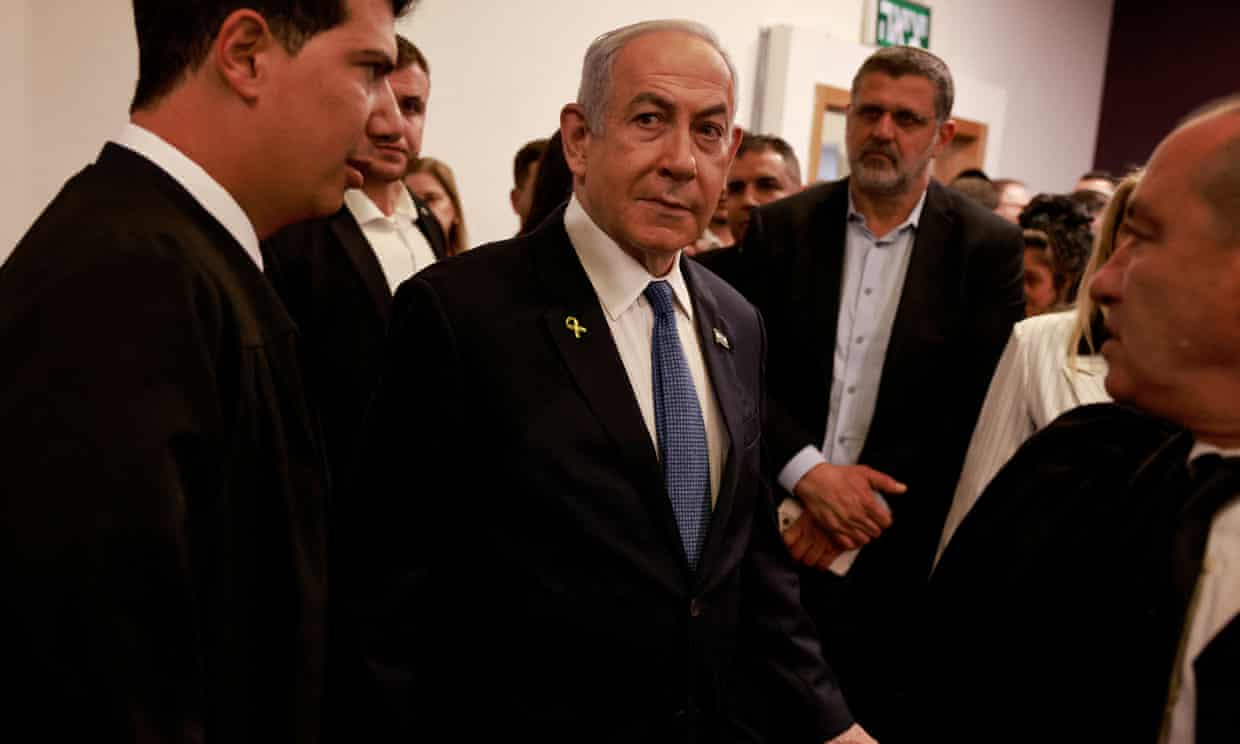Benjamin Netanyahu’s Corruption Trial: A Historic Moment in Israeli Politics

Breaking News:
आधार कार्ड से मोबाइल नंबर कैसे लिंक करें? (Step by Step गाइड) | 2025
इंडियन प्रीमियर लीग (IPL) 2025: भारत-पाकिस्तान तनाव के चलते टूर्नामेंट अनिश्चितकाल के लिए स्थगित
बलूचिस्तान में बड़ा उथल-पुथल: बलूच विद्रोहियों ने क्वेटा पर कब्जा किया, पाकिस्तानी सेना को बाहर किया
पाकिस्तान में सेना प्रमुख Asim Munir की गिरफ्तारी: भारत-पाक तनाव के बीच बड़ा राजनीतिक भूचाल
Kathmandu Nepal
Thursday, Feb 26, 2026

In a groundbreaking event, Israeli Prime Minister Benjamin Netanyahu has taken the stand in his long-running corruption trial, becoming the first sitting leader of Israel to testify as a criminal defendant. The trial, held in Tel Aviv, has drawn significant national and international attention, with accusations of fraud, breach of trust, and bribery casting a shadow over his lengthy political career.
Dressed in a blue suit with symbolic ribbons representing Israel and hostages in Gaza, Netanyahu opened his testimony by expressing relief at finally being able to present his side of the story.
“I have waited eight years for this moment, to say the truth as I remember it, which is important for justice,” Netanyahu declared, positioning himself as both a victim of alleged political persecution and a steadfast leader guiding his country through a “seven-front war.”
Netanyahu faces allegations across three high-profile cases—popularly referred to as Cases 1,000, 2,000, and 4,000:
Netanyahu has denied all accusations, labeling them “an ocean of absurdness” and part of a politically motivated witch-hunt orchestrated by biased legal institutions and a hostile media.
The trial has seen testimony from 120 prosecution witnesses, including some of Netanyahu’s closest former aides who turned state witnesses. They have portrayed Netanyahu as an image-obsessed leader who prioritized personal gains over public service.
Despite these claims, Netanyahu and his defense team argue that the charges lack credibility. His lawyer, Amit Hadad, criticized the investigation, stating, “The Israeli police did not investigate a crime, but a person,” drawing comparisons to authoritarian regimes.
In court, Netanyahu portrayed himself as a tireless public servant working 17 to 18 hours daily, eating simple meals at his desk while addressing national and international issues. He denied any personal indulgence, stating that while he smoked cigars, he rarely finished them, and he detested champagne.
Netanyahu also used the opportunity to highlight his political achievements and international stature, presenting himself as a leader of global significance.
The trial has deepened existing divisions in Israeli society. Outside the Tel Aviv courthouse, rival demonstrations erupted, with banners reading “Crime Minister” displayed by protesters and statements of solidarity voiced by his supporters.
This legal battle comes at a time of heightened political tension in Israel. Netanyahu’s government has faced criticism over attempts to curtail the judiciary’s powers, further polarizing the nation.
The ongoing Gaza war, sparked by the Hamas attacks on October 7, 2023, briefly united Israelis in grief and resilience. However, as the conflict persists, political unity has fractured, bringing Netanyahu’s legal troubles back into the spotlight.
Netanyahu’s trial has also reignited debates over the intersection of power and accountability in Israeli politics. Under Israeli law, indicted prime ministers are not required to resign, but the charges have raised questions about the future of his leadership.
Benjamin Netanyahu’s corruption trial marks a turning point in Israeli history, reflecting the complexities of governance, accountability, and public trust. As the trial continues, its outcome will have significant implications not only for Netanyahu’s political career but also for Israel’s democracy.
This case serves as a reminder of the challenges faced by leaders in balancing personal conduct with public responsibility, leaving the nation and the world closely watching this unprecedented legal and political saga.
One Reply to “Benjamin Netanyahu’s Corruption Trial: A Historic Moment in Israeli Politics”